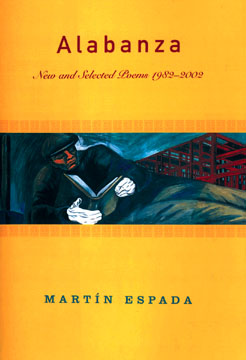On Saturday, April 5, poet Martin Espada launched the release of his new book Alabanza: New and Selected Poems (1982-2002) (W.W. Norton, $24.95) with a brief reading and signing at the Grollier Poetry Book Shop on Plympton Street in Cambridge. At approximately 5:30 pm, the high-spirited author addressed a packed room by proudly introducing himself, his wife and son, and his new book. The event commemorated Mr. Espada’s first public reading, which was held at Grollier twenty years ago.
The poet read from only four poems in his new collection, but the selections were an accurate reflection of his body of work. The first poem, “Mrs. Baez Serves Coffee on the Third Floor,” embodies Mr. Espada’s poetry on social injustice, a theme that finds its way into much of his work. As a Latino American and former tenant lawyer in Chelsea, these poems draw from personal, autobiographical, and biographical experience. His second poem, “?n la calle San Sebastian,” grows out of the rhythmic musical traditions of Puerto Rico, and, like his third poem, “Inheritance of Waterfall and Sharks,” attempts to address issues of cultural identity and the necessity of poetry. He preceded the final reading of his collection’s title piece, “Alabanza: In Praise of Local 100,” with a plea for humanity, non-violence, and compassion in the world post 9/11:
“…When the war began, from Manhattan and Kabultwo constellations of smoke rose and drifted to each other,mingling in icy air, and one said with an Afghan tongue:Teach me to dance. We have no music here.And the other said with a Spanish tongue:I will teach you. Music is all we have.”
Overall, Alabanza is a fine collection of Mr. Espada’s most well known poetry. Spanning the bulk of his career as a writer, the book contains selections from his seven other books as well as 17 previously unreleased and new poems. Like most of Mr. Espada’s work, the collection balances serious themes with a sense of hope and humor. Missing from this collection, and highly recommended, are Mr. Espada’s essays on a range of topics that deal with social injustice. One of these essays discusses a NIKE campaign that solicited the poet to write a poem for the Olympics, which he declined on the grounds that “Poems are not Pop-Tarts,” further suggesting that the award money be used to compensate women in the company’s sweatshops. Another describes an episode in which NPR commissioned and then refused to air a poem that Mr. Espada wrote about Mumia Abu-Jamal, prompting a controversy that resulted in the poet’s being banned from the organization. Nonetheless, Alabanza captures the poet at his best, and is a valuable resource for new readers as well as those already familiar with his work.
Mr. Espada was born in Brooklyn, New York in 1957. His poetry has earned him an American Book Award, the PEN/Revson Fellowship, as well as the Paterson Poetry Prize. He currently teaches in the Department of English at the University of Massachusetts Amherst, and will partake this summer in the Joiner Center’s Annual Writer’s Workshop at UMass Boston.





















































